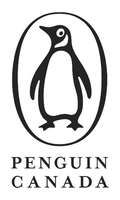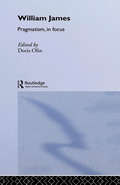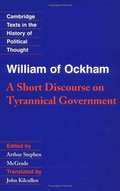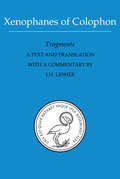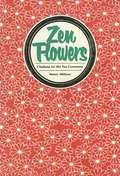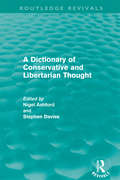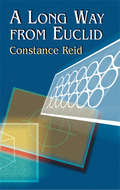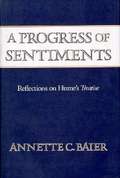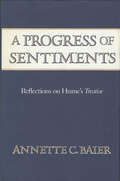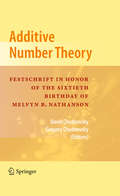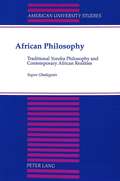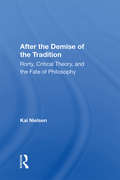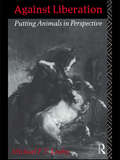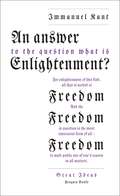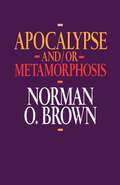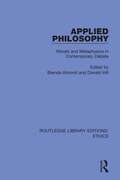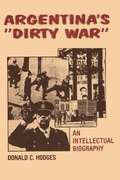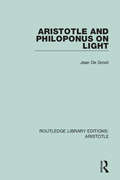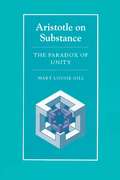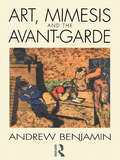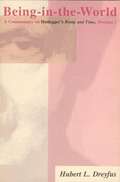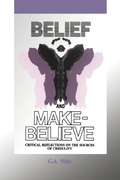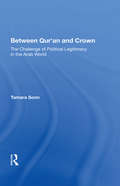- Table View
- List View
Voltaire's Bastards: The Dictatorship Of Reason In The West
by John Ralston SaulVoltaire's Bastards: The Dictatorship of Reason in the West is a sweeping and provocative exploration of nothing less than the political, economic, social, and cultural origins of Western society. With great daring and originality, John Ralston Saul dissects the contradictions, delusions, and illusions that have brought the world to the brink of confusion and crisis, and shatters the myths surrounding the icons and institutions that we have been taught to revere and cherish.
William James Pragmatism in Focus (Philosophers In Focus Ser.)
by Doris OlinThis book presents William James's Pragmatism together with critical commentary and focuses on the theories of meaning and truth central to Pragmatism. It includes several articles three of which were roughly contemporaneous with the publication of Pragmatism.
William of Ockham: A Short Discourse on the Tyrannical Government
by William Of Ockham Arthur Stephen Mcgrade John KilcullenWilliam of Ockham (c. 1285-c. 1387) was the most eminent theologian and philosopher of his day, a Franciscan friar who came to believe that the Avignonese papacy of John XXII had set out to destroy the religious ideal on which his order was based: the complete poverty of Christ and the Apostles. A Short Discourse on Tyrannical Government is an attack on the claims of the medieval Church, specifically the papacy, to universal spiritual and secular power. Written at the time of the emergence of the European nation-states, Ockham's work issued a direct hard-hitting challenge to the claims of limitless papal power. The text is accompanied by a full bibliography, a chronology and an introduction setting his work in its intellectual and historical context.
Wise Choices, Apt Feelings: A Theory of Normative Judgment
by Allan GibbardThis book examines some of the deepest questions in philosophy: What is involved in judging a belief, action, or feeling to be rational? What place does morality have in the kind of life it makes most sense to lead? How are we to understand claims to objectivity in moral judgments and in judgments of rationality? When we find ourselves in fundamental disagreement with whole communities, how can we understand our disagreement and cope with it? To shed light on such issues, Allan Gibbard develops what he calls a “norm-expressivistic analysis” of rationality. He refines this analysis by drawing on evolutionary theory and experimental psychology, as well as on more traditional moral and political philosophy. What emerges is an interpretation of human normative life, with its quandaries and disputes over what is rational and irrational, morally right and morally wrong. Judgments of what it makes sense to do, to think, and to feel, Gibbard argues, are central to shaping the way we live our lives. Gibbard does not hesitate to take up a wide variety of possible difficulties for his analysis. This sensitivity to the true complexity of the subject matter gives his treatment a special richness and depth. The fundamental importance of the issues he addresses and the freshness and suggestiveness of the account he puts forward, along with his illuminating treatment of aspects of sociobiology theory, will ensure this book a warm reception from philosophers, social scientists, and others with a serious interest in the nature of human thought and action.
Xenophanes of Colophon
by James LesherXenophanes of Colophon was a philosophical poet who lived in various cities of the ancient Greek world during the late sixth and early fifth centuries BC. In this book, James Lesher presents the Greek texts of all the surviving fragments of Xenophanes' teachings, with an original English translation on facing pages, along with detailed notes and commentaries and a series of essays on the philosophical questions generated by Xenophanes' remarks. Also included are English translations of all the ancient testimonia relating to Xenophanes' life and teachings, and a discussion of how many of the testimonia pose the impediments to achieving a consistent interpretation of his philosophy.The Xenophanes who emerges in this account fully warrants classification as a philosophical thinker: moral critic and reflective student of nature, critic of popular religious belief and practice, and perhaps the first to challenge claims to knowledge about divine matters and the basic forces at work in nature. As with earlier works in the Pheonix series, this volume aims to make an important portion of Presocratic writing accessible to all those interested in ancient philosophy and the first phase of European natural science. This new paperback edition contains an updated bibliography.
Zen Flowers: Chabana for the Tea Ceremony
by Henry MittwerThis Zen flower arranging book teaches the delicate art of Japanese Chabana--the precursor to ikebana.<P><P>Up to now, with the exception of Okakura Kakuzo's excellent account of flowers used in the art of Chanoyu in his delightful The Book of Tea, almost nothing has been available on the subject. To my knowledge, the present volume is the only book written in English that is wholly devoted to the special form of flower arrangement called Chabana.Chabana is a type of flower arrangement that originated in the tea room . Chabana is not only for decoration, for symbolic representation, or for abstract expression of the self. 2,500years ago, Chabana has something in common with one of Shakyamuni Buddha's sermons. Buddha lightly picked a single bloom from a basketful of flowers offered to Him by one of the multitude who came to hear His sermon. Buddha slowly, silently, held up the flower before the congregation. Among the gathering was one of His disciples, Mahakasyapa, who gently smiled as he apprehended the Buddha's gesture. Chabana may not be a flower arrangement having a Zen-like mission, but it certainly is a flower arrangement appreciated by a mind nourished with the Zen principles of simplicity and directness.
A Dictionary of Conservative and Libertarian Thought (Routledge Revivals)
by Stephen Davies Nigel AshfordFirst published in 1991, this is a reissue of the path-breaking Dictionary of Conservative and Libertarian Thought, the first book to examine the ideals and arguments produced by the intellectual traditions of both conservatism and classical liberalism. Covering the ideas of many such distinguished thinkers as Hayek, Scruton, Friedman and Buchanan, the volume provides a valuable survey of the historical development of both schools of thought in all of the major western countries and their contributions to contemporary debates. From American Conservatism to French Liberalism, Invisible Hand to Organic Society, from Scientism to Scepticism and Utopianism to Voluntarism, this is a vital work whose reissue will be welcomed as much by the keen layperson as by students of political science, the history of philosophy, economics and public policy.
A Long Way from Euclid
by Constance ReidMathematics has come a long way indeed in the last 2,000 years, and this guide to modern mathematics traces the fascinating path from Euclid's Elements to contemporary concepts. No background beyond elementary algebra and plane geometry is necessary to understand and appreciate author Constance Reid's simple, direct explanations of the arithmetic of the infinite, the paradoxes of point sets, the "knotty" problems of topology, and "truth tables" of symbolic logic. Reid illustrates the ways in which the quandaries that arose from unsolvable problems promoted new ideas. Numerical concepts expanded to accommodate such concepts as zero, irrational numbers, negative numbers, imaginary numbers, and infinite numbers.Geometry advanced into the widening territories of projective geometry, non-Euclidean geometries, the geometry of n-dimensions, and topology or "rubber sheet" geometry. More than 80 drawings, integrated with the text, assist in cultivating a grasp of the abstract foundations of modern mathematics, the search for truly consistent assumptions, the recognition that absolute consistency is unattainable, and the realization that some problems can never be solved.
A Progress of Sentiments: Reflections on Hume's Treatise
by Annette C. BaierAnnette Baier’s aim is to make sense of David Hume’s Treatise as a whole. Hume’s family motto, which appears on his bookplate, was “True to the End.” Baier argues that it is not until the end of the Treatise that we get his full story about “truth and falsehood, reason and folly.” By the end, we can see the cause to which Hume has been true throughout the work. <p><p> Baier finds Hume’s Treatise on Human Nature to be a carefully crafted literary and philosophical work which itself displays a philosophical progress of sentiments. His starting place is an overly abstract intellectualism that deliberately thrusts passions and social concerns into the background. In the three interrelated books of the Treatise, his “self-understander” proceeds through partial successes and dramatic failures to emerge with new-found optimism, expecting that the “exact knowledge” the morally self-conscious anatomist of human nature can acquire will itself improve and correct our vision of morality. Baier describes how, by turning philosophy toward human nature instead of toward God and the universe, Hume initiated a new philosophy, a broader discipline of reflection that can embrace Charles Darwin and Michel Foucault as well as William James and Sigmund Freud. Hume belongs both to our present and to our past.
A Progress of Sentiments: Reflections on Hume’s <i>Treatise</i> (Emersion: Emergent Village Resources For Communities Of Faith Ser.)
by Annette C. BaierAnnette Baier’s aim is to make sense of David Hume’s Treatise as a whole. Hume’s family motto, which appears on his bookplate, was “True to the End.” Baier argues that it is not until the end of the Treatise that we get his full story about “truth and falsehood, reason and folly.” By the end, we can see the cause to which Hume has been true throughout the work.Baier finds Hume’s Treatise on Human Nature to be a carefully crafted literary and philosophical work which itself displays a philosophical progress of sentiments. His starting place is an overly abstract intellectualism that deliberately thrusts passions and social concerns into the background. In the three interrelated books of the Treatise, his “self-understander” proceeds through partial successes and dramatic failures to emerge with new-found optimism, expecting that the “exact knowledge” the morally self-conscious anatomist of human nature can acquire will itself improve and correct our vision of morality. Baier describes how, by turning philosophy toward human nature instead of toward God and the universe, Hume initiated a new philosophy, a broader discipline of reflection that can embrace Charles Darwin and Michel Foucault as well as William James and Sigmund Freud. Hume belongs both to our present and to our past.
Additive Number Theory: Festschrift In Honor of the Sixtieth Birthday of Melvyn B. Nathanson
by David Chudnovsky Gregory ChudnovskyThis impressive volume is dedicated to Mel Nathanson, a leading authoritative expert for several decades in the area of combinatorial and additive number theory. For several decades, Mel Nathanson's seminal ideas and results in combinatorial and additive number theory have influenced graduate students and researchers alike. The invited survey articles in this volume reflect the work of distinguished mathematicians in number theory, and represent a wide range of important topics in current research.
African Philosophy: Traditional Yoruba Philosophy and Contemporary African Realities
by Segun GbadegesinThe question whether or not there is African philosophy has, for too long, dominated the philosophical scene in Africa, to the neglect of substantive issues generated by the very fact of human existence. This has unfortunately led to an impasse in the development of a distinctive African philosophical tradition. In this path-breaking book, Segun Gbadegesin offers a new and promising approach which recognizes the traditional and contemporary facets of African philosophy by exploring the issues they raise. In Part I, the author examines, with refreshing insights, the philosophical concepts of the person, individuality, community and morality, religiosity and causality, focusing on the Yoruba of Nigeria. Part II discusses, in an original way, contemporary African social, political and economic realities from a philosophical perspective.
After The Demise Of The Tradition: Rorty, Critical Theory, And The Fate Of Philosophy
by Kai NielsenThis ambitious book addresses the "end-of-philosophy" debate and the challenge it presents to contemporary philosophy, both continental and analytic. It is a chain of argument as well as a conversation conducted in the presence of the major contributors to that debate: the critics (especially Richard Rorty) of the dominantly Platonic-Cartesian-Kantian tradition on the one hand and its defenders on the other. Nielsen's account draws on Wittgenstein, Quine, Davidson, Habermas, and Foucault, among others. Nielsen takes Rorty's arguments seriously and insists that they demand a rethinking of the role of philosophy in a world in which the claims of relativism, nihilism, and historicism loom increasingly larger. But, unlike most who are impressed with the end-of-philosophy argument, he provides an original and constructive response: the development of a holistic, antifoundationalist account of philosophy that utilizes a form of critical theory and wide reflective equilibrium in carving out a positive role for a new kind of philosophy. This is an important book not just for philosophers but tor social theorists, for literary critics, and indeed for scholars in any field in which the status of knowledge has become problematic.
Against Liberation: Putting Animals in Perspective
by Michael P. LeahyThe Western world is currently gripped by an obsessive concern for the rights of animals - their uses and abuses. In this book, Leahy argues that this is a movement based upon a series of fundamental misconceptions about the basic nature of animals.This is a radical philosophical questioning of prevailing views on animal rights, which credit animals with a self-consciousness like ours. Leahy's conclusions have implications for issues such as bloodsports, meat eating and fur trading.
Alien Phenomenology, or What It’s Like to Be a Thing (Posthumanities)
by Ian BogostHumanity has sat at the center of philosophical thinking for too long. The recent advent of environmental philosophy and posthuman studies has widened our scope of inquiry to include ecosystems, animals, and artificial intelligence. Yet the vast majority of the stuff in our universe, and even in our lives, remains beyond serious philosophical concern. In Alien Phenomenology, or What It&’s Like to Be a Thing, Ian Bogost develops an object-oriented ontology that puts things at the center of being—a philosophy in which nothing exists any more or less than anything else, in which humans are elements but not the sole or even primary elements of philosophical interest. And unlike experimental phenomenology or the philosophy of technology, Bogost&’s alien phenomenology takes for granted that all beings interact with and perceive one another. This experience, however, withdraws from human comprehension and becomes accessible only through a speculative philosophy based on metaphor.Providing a new approach for understanding the experience of things as things, Bogost also calls on philosophers to rethink their craft. Drawing on his own background as a videogame designer, Bogost encourages professional thinkers to become makers as well, engineers who construct things as much as they think and write about them.
An Answer to the Question: 'What is Enlightenment?' (Penguin Great Ideas)
by Immanuel KantImmanuel Kant was one of the most influential philosophers in the whole of Europe, who changed Western thought with his examinations of reason and the nature of reality. In these writings he investigates human progress, civilization, morality and why, to be truly enlightened, we must all have the freedom and courage to use our own intellect. Throughout history, some books have changed the world. They have transformed the way we see ourselves - and each other. They have inspired debate, dissent, war and revolution. They have enlightened, outraged, provoked and comforted. They have enriched lives - and destroyed them. Now Penguin brings you the works of the great thinkers, pioneers, radicals and visionaries whose ideas shook civilization and helped make us who we are.
Apocalypse and/or Metamorphosis
by Norman O. BrownHere is the final volume of Norman O. Brown's trilogy on civilization and its discontents, on humanity's long struggle to master its instincts and the perils that attend that denial of human nature. Following on his famous books Life Against Death and Love's Body, this collection of eleven essays brings Brown's thinking up to 1990 and the fall of Communism in Eastern Europe.Brown writes that "the prophetic tradition is an attempt to give direction to the social structure precipitated by the urban revolution; to resolve its inherent contradictions; to put an end to its injustice, inequality, anomie, the state of war . . . that has been its history from start to finish." Affiliating himself with prophets from Muhammad to Blake and Emerson, Brown offers further meditations on what's wrong with Western civilization and what we might do about it. Thus the duality in his title: crisis and the hope for change. In pieces both poetic and philosophical, Brown's attention ranges over Greek mythology, Islam, Spinoza, and Finnegan's Wake. The collection includes an autobiographical essay musing on Brown's own intellectual development. The final piece, "Dionysus in 1990," draws on Freud and the work of Georges Bataille to link the recent changes in the world's economies with mankind's primordial drive to accumulation, waste, and death.
Applied Philosophy: Morals and Metaphysics in Contemporary Debate
by Brenda Almond Donald HillIn bringing the concepts and methods of philosophy to bear on specific, pressing, practical concerns, applied philosophy is the modern expression of a perennial concern: to understand, in part to control, and to come to terms with the conditions in which human life is to be lived. Originally published in 1991 and written by distinguished philosophers and academics from Europe, the USA and Australia, the essays collected in this volume examine subjects of continued concern and debate, such as the environment, personal relationships, terrorism and medicine. The contributions were originally published in the Journal of Applied Philosophy.
Argentina's "Dirty War": An Intellectual Biography
by Donald C. HodgesArgentines ask how their ultracivilized country, reputedly the most European in Latin America, could have relapsed into near-barbarism in the 1970s. This enlightening study seeks to answer that question by reviewing the underlying political events and intellectual foundations of the "dirty war" (1975-1978) and overlapping Military Process (1976-1982). It examines the ideologies and actions of the main protagonists-the armed forces, guerrillas, and organized labor- over time and traces them to their roots. In the most comprehensive treatment of the subject to date, Hodges examines primary materials never seen by other researchers, including clandestinely published guerrilla documents, and interviews important actors in Argentina's political drama. His wide-ranging scholarship traces the origins of the national security and national salvation doctrines to the Spanish Inquisition, sixteenth-century witch hunts, and nineteenth-century reactions to the modernizing ideologies of liberalism, democracy, socialism, and communism. Hodges posits that the "dirty war," Military Process, and revolutionary war to which they responded represented the culmination of social tensions that arose in 1930 with the launching of the Military Era by Argentina's first successful twentieth-century coup. He offers the disquieting hypothesis that as long as the "Argentine Question" remains unsettled the military may intervene again, the resistance movement will remain strong, and violence may continue even under a democratic government. Donald C. Hodges (1923-2009) was professor of philosophy and affiliate professor of political science at Florida State University.
Aristotle and Philoponus on Light (Routledge Library Editions: Aristotle #3)
by Jean De GrootOriginally published in 1991. Philoponus’ long commentary on Aristotle’s definition of light sets up the major concerns, both in optics and theory of light, that are discussed here. Light was of special interest in Neoplatonism because of its being something incorporeal in the world of natural bodies. Light therefore had a special role in the philosophical analysis of the interpenetration of bodies and was also a paradigm for the soul-body problem. The book contains much about the physiology of vision as well as the propagation of light. Several chapters investigate the philosophical theory behind what came to be known as ‘multiplication of species’ in medieval light theory. These issues in the history of science are placed within an analysis of Neoplatonic development of the distinction between Aristotle’s kinesis and energeia. The book treats Philoponus’ philosophy of mathematical science from the point of view of matter, quantity, and three-dimensionality.
Aristotle on Substance: The Paradox of Unity
by Mary Louise GillThis book explores a fundamental tension in Aristotle's metaphysics: how can an entity such as a living organisma composite generated through the imposition of form on preexisting matterhave the conceptual unity that Aristotle demands of primary substances? Mary Louise Gill bases her treatment of the problem of unity, and of Aristotle's solution, on a fresh interpretation of the relation between matter and form. Challenging the traditional understanding of Aristotelian matter, she argues that material substances are subverted by matter and maintained by form that controls the matter to serve a positive end. The unity of material substances thus involves a dynamic relation between resistant materials and directive ends. Aristotle on Substance offers both a general account of matter, form, and substantial unity and a specific assessment of particular Aristotelian arguments. At every point, Gill engages Aristotle on his own philosophical ground through the detailed analysis of central, and often controversial, texts from the Metaphysics, Physics, On Generation and Corruption, De Anima, De Caelo, and the biological works. The result is a coherent, firmly grounded rethinking of Aristotle's central metaphysical concepts and of his struggle toward a fully consistent theory of material substances.
Art, Mimesis and the Avant-Garde: Aspects of a Philosophy of Difference
by Andrew BenjaminFirst published in 1991. Routledge is an imprint of Taylor & Francis, an informa company.
Being-in-the-World: A Commentary on Heidegger's Being and Time Division I
by Hubert L. DreyfusDreyfus's approach to this daunting book is straightforward and pragmatic. He explains the text by frequent examples drawn from everyday life, and he skillfully relates Heidegger's ideas to the questions about being and mind that have preoccupied a generation of cognitive scientists and philosophers of mind.
Belief and Make-Believe
by George Albert WellsWhy do so many people - sometimes even intelligent people - swallow the preposterous claims of religion? G.A. Wells, the leading freethinker of our time, tries to shed light on this puzzle in his entertaining and enormously learned book, Belief and Make-Believe.Professor Wells begins by analyzing the nature of belief. To dispel popular confusions on the relation between words and thoughts, he compares the thinking process of scientists, laymen, and chimpanzees.The power of emotion and instinct to help form people's ideological outlooks is analyzed by preference to "defiance" and "reliance", polar attitudes which arise from the need for dominance and submission in primate groups. Wells shows the influence of defiance and reliance in patriotism and in monotheistic religions, where submission to the will of the omnipotent is a wonderful technique for feeling secure in the face of life's actual and ineradicable dangers.Since the knowledgeable Christians now accept that the Bible is uneven, unreliable, and sometimes morally abhorrent, and that the New Testament account of the origin of Christianity is mostly legend, various attempts have been made to save something from the debris by selective re-interpretation. Wells evaluates several typical examples, showing how the apologists shrink from the clear implications of their arguments, which would demolish the whole edifice of Christian doctrine.Finally, Professor Wells debunks some of the extravagant and mystical claims that have been made for the arts, notably poetry, as quasi-religious vehicles for gaining insights into the human condition.
Between Qur'an And Crown: The Challenge Of Political Legitimacy In The Arab World
by Tamara SonnThe struggle for political legitimacy in many Middle Eastern countries today poses a dilemma for ruling elites. In order to maintain authority, leaders often must capitulate to Islamic universalist dogma, which may conflict with their own views of the state as well as threaten the legitimacy of other leaders in the region who are attempting to establish a secular, national basis for government. Tracing the roots of this dilemma in Middle Eastern history and Islamic philosophy, Dr. Sonn compares the contemporary Middle Eastern period to Europe’s “Age of Religious Wars†that preceded the emergence of the Western secular state. She describes how a process similar to the organic development of the secular state in Europe was interrupted in the Middle East by oppressive Western colonialism, which eventually led to the Muslim rejection of nationalism and all things “Western†and to the reassertion of Islam as the sole source of political legitimacy. The author shows how the philosophy of Islamic traditionalism opposes the two fundamentals of stable national political systems—a geographical limitation of authority and an institutionalized process for regular changes in leadership. Dr. Sonn bases her argument on an insightful examination of Middle Eastern history, from the formation and disintegration of the Ottoman Empire in the late nineteenth century to the present, and caps it with a detailed look at a possible solution to the dilemma: the teachings of modern scholars who advocate a new “Islamic realism†incorporating a limited definition of national identity and interests while retaining Islamic social goals.
